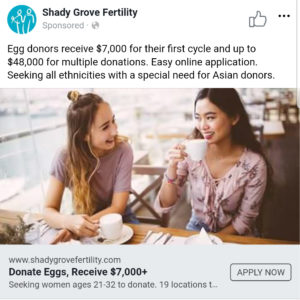Over the last two years, I noticed my Facebook and Instagram feeds filling with ads urging me to donate my eggs or to become a surrogate. At first I laughed it off. But the more ads I saw, the more concerned and uncomfortable I felt. So, I started a small experiment. Every time I saw an ad from a fertility company, I took a screenshot.
Here are just some of the results, from over thirty unique ads replayed numerous times:
Start your day with Public Discourse
Sign up and get our daily essays sent straight to your inbox.It troubled me that women were portrayed as Easter Bunnies; that their ovaries were compared to egg cartons; and that the donors, especially Asian women, were fetishized as exotic, smart, sexy finds, ideal for making a baby. These fertility companies ask young women like me to make a choice―somehow simultaneously altruistic and lucrative―either to sell their eggs for up to $10,000 per ovulatory cycle, or to serve as a surrogate for a couple who just wants a child of their own (for upwards of $75,000). For a college student on a tight budget, or a low-income mother trying to make ends meet, that’s a tempting offer. And I fear that the monetary compensation obfuscates the fact that this system inherently exploits women’s and children’s bodies.
It troubled me that women were portrayed as Easter Bunnies; that their ovaries were compared to egg cartons; and that the donors, especially Asian women, were fetishized as exotic, smart, sexy finds, ideal for making a baby.
A Dangerous Industry
The fertility industry targets and exploits low-income populations: wealthy companies and the powerful elite offer to pay for eggs and wombs from poor women. India, Nepal, and Thailand have recently banned commercial surrogacy because of its predatory nature. Prior to the bans, many women signed contracts with foreigners without knowing the consequences―like facing dangerous Caesarean sections—and with no guarantee of receiving postpartum care.
The fertility industry targets and exploits low-income populations: wealthy companies and the powerful elite offer to pay for eggs and wombs from poor women.
In Jennifer Lahl’s documentary Eggsploitation, women recount the devastating medical problems that they experienced as a result of donating their eggs, including Ovarian Hyper Stimulation Syndrome; puncture, torsion, or loss of their ovaries; infertility; strokes; and reproductive cancers.
Surrogacy can have even worse consequences. Some surrogates have died in childbirth or suffered severe complications from pregnancy. Women that participated in both egg donation and surrogacy told Jennifer how no one informed them of the risks. When many women faced catastrophic health issues, their doctors ignored them, and fertility agencies did nothing to cover the costs of their massive medical bills. Because of their desire to help others, many of these women lost the ability to have their own children, and paid far more than they had bargained.
The European Union has also banned commercial surrogacy, declaring the practice “reproductive exploitation,” which “undermines the human dignity of the woman, since her body and its reproductive functions are used as a commodity.” However, in the United States, the practice continues, because there the desires of wealthy and privileged adults currently trump the rights of poor women and vulnerable children.
The truth is that no one has the right to a child, and that the bodies of women and children should never be treated as commodities.
Who’s the Parent?
In even the most routine of surrogate pregnancies or donor conceptions, a child can have as many as six parents: the genetic father, the genetic mother, the surrogate mother, her spouse, and the intended parents.
Unfortunately, the state views parents as legally interchangeable. In California, a new law went into effect last year that requires birth certificates to list only the intended parents as the “natural parents.” Biological and surrogate parents will no longer be listed. The stamp of parentage is now arbitrarily decided by a contract that names each individual as parent, partner, surrogate, or donor.
Consider the case of Melissa Cook, a surrogate mother of triplets from Orange County. The intended father, Shannon Moore, a deaf single man living in his parents’ basement, urged Melissa to abort one of the triplets since he couldn’t pay the extra cost of another baby. Melissa refused and did not charge Shannon any money after the births of the children. She only wanted these babies to have a good, loving home.
Months after the triplets’ placement with Shannon, Melissa was horrified to learn that the intended father had a history of killing pets, lives with unstable family members, left the infants alone for hours, forced them to eat off the dirty floor of the basement, and changed their diapers so infrequently that the baby boys suffered severe rashes and had to be taken to the hospital. Shannon’s sister even contacted social workers begging them to take the triplets, saying that her brother was “unable to care for the children.” Heartbroken, Melissa sued for custody to protect the boys from abuse and neglect. Because surrogates are considered legal strangers to the children they carry, her request was denied. To this day, Shannon retains exclusive custody of the triplets as both their legal and “natural” parent.
The Rights of the Child
According to the UN Convention on the Rights of the Child, a child has the right “to know and be cared for by his or her parents,” to “preserve his or her identity,” including “family relations,” and not to be separated from parents against his will. In case a separation becomes necessary, the child has the right to “maintain personal relations and direct contact with both parents on a regular basis.”
Americans are generally very aware that adopted children suffer from being separated from their natural parents. For proper psychosocial development, children need to form attachments with their biological parents, siblings, and extended family. They need to know their heritage and identity. Adoptive families and agencies show immense sensitivity to adopted children’s needs and work hard to remedy the trauma of adoption. Many of them practice open adoption, preserve records, identify the child’s cultural roots, and incorporate traditions from the child’s birth culture into family life. And yet, at the same time, our society sanctions the creation of children for the express purpose of separating them from their biological family. The desire to create a family and to love a child is good and noble. But it is neither noble nor loving to create a child so that it can suffer separation and loss.
Gestational surrogates also bond with the children whom they carry throughout the nine months of pregnancy, as they feed, shelter, nurture, love, and protect them. But the attachment is severed at birth. Research shows that children who are carried by gestational surrogates are more likely than the general population to experience depression. The surrogate mothers also face severe emotional experiences. This correlation suggests that, even though the child and mother lack biological ties to each other, they still feel a loss when they are separated. Thus society creates these children in order to make them suffer twice over: from being separated not only from their genetic parents but also from the women who carry them.
Lost Identity
The first generations of children who were conceived by donors and borne by surrogates are now adults, and many are searching for themselves. Message boards like the Donor Sibling Registry allow young people to find half-siblings and relatives whom they never knew to exist. The community that these platforms help to create is growing, but not all the members’ stories end happily. One young woman, Kathleen LaBounty from Texas, discovered that she had been conceived by a sperm donor who was a Texas A&M medical student. She contacted every man who had attended the school during the years prior to her conception. Although she heard from hundreds of men, she still did not discover her father. In an open letter, Kathleen describes feeling “empty and extremely cheated out of important aspects of life.” She desperately wants to find out if her “interests, appearance, life views, and personality” match those of her biological father.
Scores more children have written on the site Them Before Us to share their stories of longing and loss. One daughter reflected soberly about her traditional surrogate mother (that is, who conceived the child by her own ovum and artificial insemination): “When you know that a huge part of the reason that you came into the world is due solely to a paycheck, and that after [the payment is received] you are disposable, given away and never thought of again, it impacts how you view yourself.” Just as surrogates are treated as wombs for rent, surrogacy turns children into a commodity to be bought and sold.
Women and Children Should Not Be for Sale
Surrogacy and donor-conception are frequently in the news as more and more celebrities pay for these services. Missing from the Instagram posts and tabloids are the stories of the other family members that are affected by these actions. What do donor-conceived and surrogate-born children think of their conception and family history? What about the surrogate mothers and donor parents? Lost in the legal and financial drama are the rights of children to know their biological parents and the rights of women to receive full information about the risks of these procedures.
The truth is that no one has the right to a child, and that the bodies of women and children should never be treated as commodities. Just because we can do something does not make it right. And in the case of reproductive technology, the least society can do is to protect the right of children to know who they are and to protect the right of women not to be exploited.


















